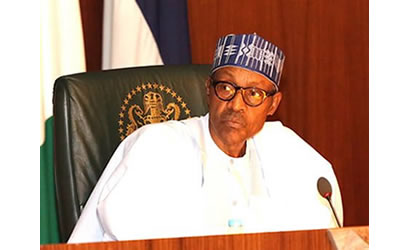The controversy trailing the appointment of a substantive Chief Justice of Nigeria (CJN) may soon result in the president losing the constitutional power to appoint the head of the judiciary.
If those pushing for the bipartisan legislative move succeed, state governors would also lose the appointive power over Chief Judges.
Saturday Tribune can disclose that the delay by President Muhammadu Buhari in completing the substantive appointment process of acting Chief Justice of Nigeria, Justice Walter Nkanu Onnoghen, is the catalyst that activated those behind the latest effort.
But one of the proponents who demanded absolute anonymity, pointed out that it was a constitutional misnomer in the first instance for the head of one arm of government to be able to hold to ransom, the appointment of the head of another independent arm.
While exonerating the framers of the constitution, the “change” advocate said future legislations should henceforth be looking at extreme situations.
The advocate added that when the framers of the constitution were giving constitutional roles to the president and governors as well as the senate and houses of assembly, there was no envisioning of heads of executive arm, becoming lords in the appointment of judiciary heads.
While preferring to be mum on the structured Action-Plan to achieve the constitutional amendment that would deliver on the proponents’ dream, the source simply disclosed that all the requisite stakeholders in getting the job done “had been factored in and you will agree that I should not go beyond this point due to the sensitivity of this matter”.
The source, however, assured that while Onnoghen’s case may have been the catalyst, Buhari was said not to be the target, adding that there are cases of such developments in states which are more complicated than the federal matter.
The advocate cited the situation in Kano judiciary where the most senior judge of the state division, Justice Pat Mahmoud, has been consistently stopped from becoming the Chief Judge, despite having no baggage.
Pat, who incidentally is the wife of the current President of the Nigerian Bar Association (NBA), Abubakar Balarabe Mahmoud, SAN, was acting CJ for three months, before being replaced by her junior in another acting appointment.
She currently serves under her junior, the incumbent acting CJ.
There are insinuations that she is being denied the post for being a Christian, female and a Southerner, though married to a Northerner and constitutionally qualified by marriage to claim Kano indigeneship.
Months back, the National Judicial Council (NJC) cleared her of any wrongdoing over a petition written against her alleging unethical conduct.
The council also held her fit and proper for the CJ position, while rejecting the two names sent by Kano State Government, which didn’t include her’s.
NJC insisted that her name must be included as the most senior along the preferred nominees of the state, for the council to consider and recommend.
The source noted that because of the huge constitutional power given the state governor over the appointment, the stand-off between Kano State and NJC persisted, with the governor holding all stakeholders to ransom.
The source also pointed at crises in other states like Rivers under former governor and now Minister of Transport, Rotimi Amaechi, Adamawa under former Governor Murtala Nyako, Osun during the first term of Governor Rauf Aregbesola, among others.
The source asked rhetorically if the purpose of equity would be considered served “when an average CJ will possibly have no role whatsoever in the appointment of a governor or at most casting a vote and having no role whatsoever in the appointment of a Speaker, only for his own appointment as a career professional who rises through the ranks, to be mainly determined by these two who are politicians with vested interest, particularly by a governor who is now empowered to put the entire process on a permanent halt, because he has power to keep changing officers in acting capacity”?
The crisis and anger over Onnoghen’s unprecedented acting appointment is reportedly energizing a lot of stakeholders to queue behind the current move to divest the president and governors of the near-absolute power in determining the personalities that would head the various judicial divisions in their domains.
No Chief Justice had been appointed in acting capacity, save for Justice Aloysius Katsina-Alu who was sworn-in by his immediate predecessor-in-office, Justice Idris Legbo Kutigi, due to the absence of the then ailing President Umaru Musa Yardua, who later died.
Katsina-Alu was immediately confirmed as substantive CJN, when the then Vice-President Goodluck Jonathan constitutionally took over the nation’s leadership.
Buhari appointed Onnoghen acting CJN on November 10, following the retirement of immediate past CJN, Justice Mahmud Mohammed.
He was nominated as substantive CJN by the Federal Judicial Service Commission (FJSC) to the National Judicial Council (NJC) which recommended him solely to the president as “the most fit and proper person to be the next Chief Justice”.
Despite receiving the council’s recommendation on October 10, a month before Mahmud’s retirement date, Buhari did not forward his name to the senate for confirmation as required by the constitution.
When a stalemate was obviously imminent 24 hours to Mahmud retiring, the president wrote to the former CJN on November 9, announcing Onnoghen’s appointment in acting capacity.
The acting appointment is constitutionally for three months which will effectively end Onnoghen’s tenure on February 10, if Buhari fails to send his name to the senate for confirmation in substantive capacity.
Onnoghen is the first Southern CJN in more than 29 years, a period that saw seven Northern CJN, with all being Muslim save for Katsina-Alu, a Christian from Benue State.
Legal authorities have differed on whether Buhari can renew Onnoghen’s acting appointment for another three months, though the constitution is silent on such renewal.
Former President Goodluck Jonathan renewed the acting appointment of now late Justice Dalhatu Adamu as the president, Court of Appeal, while the ousted substantive PCA, Justice Ayo Salami was suspended by the NJC.
Justice Tanko Mohammed is the most senior justice of the Supreme Court and next in CJN’s succession line.
A minister in Buhari’s cabinet had told an exclusive media gathering in Lagos weeks ago that the administration was advised to appoint the next substantive CJN from outside the Supreme Court, adding that the advice was well received.
The media chiefs at the gathering excoriated him and Buhari’s administration for treating the issue of the appointment as if the judiciary was “the boys’ quarters of the executive arm of government”.
It was learnt that an unnamed, professor of law from the Southern part of the country, may be the preferred choice of the Buhari administration.
However, Legislative sources told Saturday Tribune that the said academic would not be cleared or even given the opportunity to seek legislative clearance.
Many Southern federal legislators are reportedly being captured in the plan to take the president’s power away.
During the raid on judges’ homes by SSS, Onnoghen’s Abuja home was initially invaded by the security agency, only for the officers to withdraw after the most senior reportedly received a call.
SSS claimed his home, then as the most senior justice of the apex court, was invaded in error.
A statement issued by the SSS said he wasn’t under probe for whatever reasons.
It was learnt that those seeking to stop Onnoghen as the substantive CJN are relying on the Justice Kayode Esho’s panel report that indicted him in a major judiciary probe of 1994.
The indictment was, however, voided by Justice Bolarinwa Babalakin’s White Paper report.
Onnoghen was reportedly not invited by Esho’s panel and no defence was sought from him before the indictment conclusion was reached.
If he gets the job in substantive capacity, he will retire on December 23, 2020.
Tanko, by seniority, is expected to serve as CJN from December 24. 2020 to December 31, 2023.
Justice Kudirat Kekere-Ekun, is expected to take over from Tanko as the second female CJN in history on January 1, 2024.






